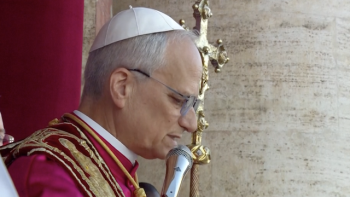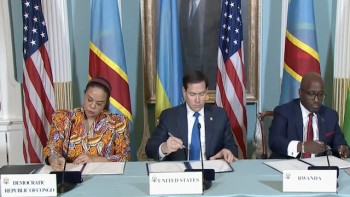On February 27, 2024, the Congolese President Félix-Antoine Tshisekedi and his Angolan counterpart, Joao Lourenco, held a meeting in Luanda, on the worsening security crisis the east of the DRC, caused by Rwandan Defense Forces (RDF) who have invaded the DRC under the cover of M23 rebels. As the meeting was going on, the Rwandan government has been reading its troops near the border with the Democratic Republic of the Congo, the Catholic Church has been expressing worries, and observers and political analysts pointed to potential human tragedy similar to the one in Rwanda in 1994.
The meeting in Luanda between the Congolese President Félix-Antoine Tshisekedi and Angolan President Joao Lourenco followed the mini-summit on security in eastern DRC, organized on February 18, 2024 on the sidelines of the African Union summit in Addis Ababa, Ethiopia.
Felix Tshisekedi's Reverse Stance Against Rwanda Has Raised Concerns
The observers and political analysts contacted by AfroAmerica Network have suggested that the meeting in Luanda should draw concerns for the Congolese people, especially given that it followed a recent speech by President Félix-Antoine Tshisekedi, in which he walked away from his seemingly resolved threats, during his presidential elections campaign, of fighting off the Rwanda Defense Forces (RDF) all way to Kigali, Rwanda and overthrowing Paul Kagame's regime, if Rwandan troops are not withdrawn from Eastern DRC (see here: DR Congo: President Felix Tshisekedi Urges Congolese to Have Empathy for Rwandans, and Rather Target Rwandan Dictator Paul Kagame and His Diabolic Oligarchy).
In fact, during a press conference in Kinshasa on February 22, 2024, when asked whether he was still standing with his threats made during the electoral campaign, to attack Rwanda, “at the slightest skirmish”, the Congolese President reacted:
“The context in which we find ourselves today, I can tell you, I am a privileged observer of what is happening, does not allow me to put into practice what I had said. My priority is peace. I want definitive peace, for my country and my people. And for that, I am ready to put my warlike desires on hold. I pause them because I want to give peace a chance. If we can obtain this peace without war, well, I sign with both hands! »
His statements shocked both the Congolese people and the majority of Rwandans who are opposed to the wars in DR Congo. These people had viewed his threats as heroic and irreversible, and hence raised questions on what was going on behind his sudden reverse position.
Suddenly, the following day, on February 23, 2024, President Félix-Antoine Tshisekedi communicated his expectations to the Under-Secretary of State for African Affairs of the American Government of seeing the United States impose dissuasive sanctions against Rwandan government leaders, for their active involvement in the continued deterioration of the security situation in eastern DRC.
Many observers and political analysts went on to point to the similitudes between the potential Luanda Accord and the Arusha Accords of 1994 that involved the late Rwandan President Habyarimana Juvenal and Paul Kagame and led to a humanitarian tragedy.
Advertisement
Get the following books on Amazon:

Legs of Tornado: The Human Who Outran the Wind, an African tale about a human from a humble upbringing who outran the wind, defeated evil spirits, overcame his fate, became a respected clan chief, and triumphed ever after.
Click Here to Get the books: Even Roosters Dream to Fly and Legs of Tornado
Even Roosters Dream to Fly along with Legs of Tornado are also available on Amazon worldwide and soon on several other platforms:
For more on the book, the author, the inspiration of the stories, Visit the author website here
Check the Book Video trailer of Even Roosters Dream to Fly, here
Worries of a Repeat of the 1994 Rwandan Human Tragedy
Since the sudden change of stance by President Felix Tshisekedi, AfroAmerica Network has been contacting some political analysts and observers of the political dynamics in the Great Lakes Region of Africa, that includes the Democratic Republic of the Congo, Burundi, Rwanda, Uganda, parts of Kenya and Tanzania.
Many of these political analysts and observers pointed to the similitude between the potential Luanda Accord between DR Congo President Félix-Antoine Tshisekedi and Rwandan dictator Paul Kagame and the Arusha accords of 1994 between the late Rwandan President Habyarimana Juvenal and the then Rwandan Patriotic Front military reader Paul Kagame.
They wondered whether President Felix Tshisekedi, like the Late President Juvenal Habyarimana, is under some major pressure and whether the Great Lakes Region of Africa is about to experience a humanitarian tragedy similar to what happened in Rwanda since 1994.
In fact, it is when the late Rwandan President Habyarimana Juvenal was leaving Arusha, Tanzania after signing the implementation of the Arusha Accords that he was assassinated, allegedly by RPF troops, along with the Burundi president Cyprien Ntaryamira and their closest aides.
After the assassination, the RPF allegedly put into action a long planned bloody war strategy, including systematic massacres of Rwandan ethnic Hutu and Tutsis. Then, Hutu extremists, mixed with undercover RPF soldiers and agents, fell to the propaganda by RPF leaders and went on targeting and massacring ethnic Tutsis. Building on the massacres committed by Hutu extremists, mixed with undercover RPF soldiers and agents, RPF soldiers systematically massacred Hutus, especially those with education, and Tutsis related to Hutus, resulting in the one of worst inter-ethnic bloody tragedies in the African history.
Like Arusha, Tanzania, in Luanda, Angola there are pressures on Felix Tshisekedi to hold a direct meeting with his Rwandan counterpart, Paul Kagame and sign an accord.
As the Luanda Accord is being the center of the discussions, the new Rwandan sponsored coalition of the so-called Congolese opposition parties, known as Alliance Fleuve Congo (AFC) is being reinforced( DR Congo - Rwanda : After Comparing Rwandan Dictator Paul Kagame to Hitler, DR Congo President Tshisekedi Promises Overthrowing His Regime If Reelected.)
The honorary deputy Jean-Jacques Mamba, recently expelled from the Movement de Liberation du Congo, a political party led by the current acting Prime-Minister Jean-Pierre Bemba, joined AFC rebel movement, launched by Corneille Nangaa. Jean-Jacques Mamba has recently questioned the legitimacy of President Felix Tshisekedi and all the country's institutions.
On January 23, 2024, some political leaders in DRC created a new political platform, known as Pacte pour un Congo retrouvé, (PCR), against Union pour la Nation Congolaise (UNC) supporting Felix Tshisekedi. These include Vital Kamerhe, Tony Kanku Shiku , Julien Paluku, and Jean Lucien Busa. These top leaders later resigned from the government.
Then on February 20, 2024, some members of Felix Tshisekedi's government resigned. Those who resigned include Vital Kamerhe, Jean-Pierre Lihau, Antipas Mbusa, Puis Muabilu, Crispin Mbadu, and Claudine Ndusi.
The same scenario was happening in Rwanda in 1994 when the late President Juvenal Habyarimana's government and Rwandan institutions were questioned by the opposition political parties then working with RPF, just before the signature of Arusha Accords and the assassination of PresidentJuvenal Habyarimana.
Reacting to Jean-Jacques Mamba's statements, Devos Kitoko Mulenda, executive secretary of Martin Fayulu's ECIDE political party pointed to the manipulations by Rwandan regime saying that “these rallies in the ranks of the enemies are due to post-electoral frustrations”.
Rwanda Troops Getting Ready for a Repeat of the 1994 Rwandan Human Tragedy
As Congolese President Félix-Antoine Tshisekedi and Angolan President Joao Lourenco were meeting, there were also reports coming from sources close to the Rwandan Defense Forces leaders that Rwandan Defense Forces (RDF) troops deployed near the border with the Democratic Republic of Congo have been getting ready to attacks and to emulate what happened in Rwanda in 1994
According to the sources, these RDF troops are mostly deployed in the regions in Northwestern Rwanda especially in Bugoyi, Rwerere, Kabali, Bigogwe, Mahoko, Mutura, and Kinigi. Most of the RDF soldiers in these regions are wearing civilians clothes and may conduct operations against civilians and then blame the massacres to FARDC, SADEC and Rwandan armed opposition groups allegedly based in Eastern DRC.
Now, the main question is whether the Luanda Accord on DR Congo and its consequences could be a repeat of the Arusha Accords on Rwanda.
AfroAmerica Network is still following the dynamics.
©2024 AfroAmerica Network

















